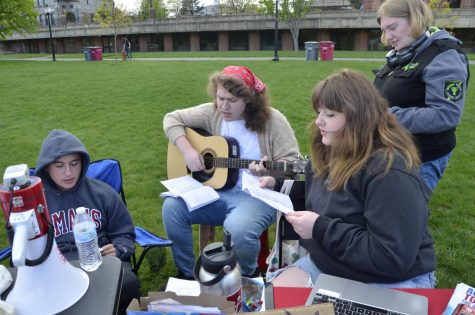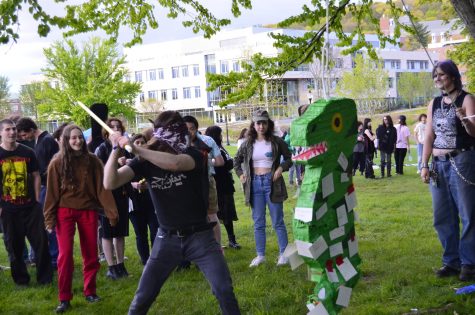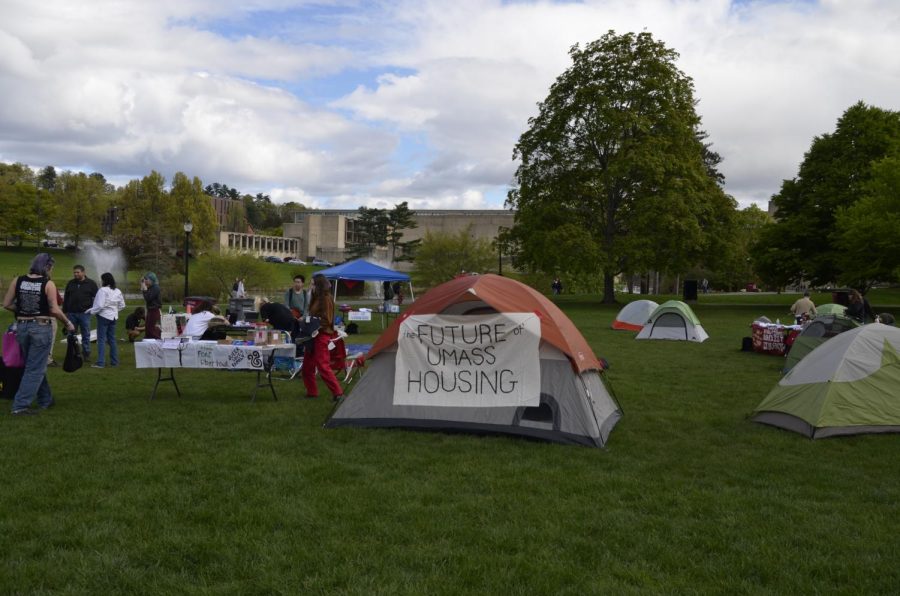On Friday, May 5, the UMass Radical Student Alliance staged another sleep-in protest to fight against the ongoing campus housing crisis and respond to — as many protestors noted — University of Massachusetts administration’s indifferent attitude towards the problem.
The all-day turned overnight event took place on the campus pond lawn. Students started to pitch tents as early as 11 a.m.
Political student groups, such as the Revolutionary Marxist Students and the Prison Abolition Collective, tabled at the event to educate attendants on their individual messages and to show how the housing crisis interconnects with other economic and social issues currently facing UMass students.
URSA is a newly formed collective made up of a number of political groups at UMass.
Ava Hawkes, a senior economic and social thought and political economy double major, is a member of URSA and a co-chair of UMass Young Communist League. She noted that URSA was formed as an umbrella organization “because we all share this core orientation, we figured it would be best to combine our struggles and come together … to form a campaign around housing.”
“We deserve to be housed here as well as educated here,” Hawkes said.
“I ask [administration] just for a minute to put yourselves in the shoes of the students that are applying for housing here … these 900 students are facing housing insecurity, that is a huge deal,” Hawkes said. “A lot of us are here because UMass is the affordable option, I know that’s certainly the case for me and that extends to on-campus housing.”
Many protestors held a general sentiment that the housing crisis was caused by the University over-admitting first year and transfer students, and that the crisis exacerbates economic disparities within the student population.
In a recent interview with the Daily Collegian, outgoing Chancellor Kumble Subbaswamy noted that there is a “master plan” when it comes to the admission process. However, he also recognized a dynamic shift in population density and distribution from the COVID-19 pandemic, which Amherst and other rural areas are feeling.
When asked about the new Fieldstone apartments, which UMass is opening for undergraduates to rent next fall, protestors were in general agreement that this is not a realistic housing solution for most students given the rental costs. The total prices for these apartments range from $18,048 to $29,652 for one year per student.
Hawkes added that the administration’s recent responses to the housing crisis “falls on deaf ears” because “it affects [students] in a very different way than it affects them.”

Later, Hawkes and other protestors expressed protest through song; one student played guitar while others sang along with lyrics promoting justice and equality.
From 5 p.m. to 8 p.m. the PAC hosted a “Spring Abolition Kickback,” which concluded their first annual abolition education week. Bands like “Bug Slam,” which is made up of current UMass students, filled the surrounding areas of campus with sound — drawing in more students as the kickback continued.
Gina Magin, a junior STPEC major, gave a speech on behalf of the PAC. Magin noted that the goals of the abolition group are innately intertwined with the housing crisis.
“I want to hold the University accountable for not guaranteeing housing, because housing is a right, it’s not a privilege for certain people on campus,” Magin said.
“I want to burn this whole system down and start over,” they added during the speech. “We need to reclaim our creativity, our dreams, our love for the community.”

Around 6 p.m., students took to hitting a piñata they called the “anti-capitalist dino.” Students wrote messages on slips of paper, such as “UMass is a corporation” and “F*** money hungry UMass,” and stuck them to the green dinosaur piñata. They took turns whacking it with a stick, until eventually candy spilled out from the breakage.
Senior history major Hunter Cohen was collecting signatures for the “URSA Housing Justice Petition.”
“After we collect all of the signatures today, we’re planning next week to deliver [the petition to administration],” Cohen said.
The petition notes that out of 217 UMass students polled by URSA, 48 percent struggle to secure on-campus housing or housing over school breaks; 25 percent of students struggle to afford on-campus housing and 22 percent struggle to afford laundry on campus.
The petition calls on incoming Chancellor Javier Reyes and other UMass administrators to meet demands such as providing disability accommodations in all dorms, providing affordable housing to all students who request a housing appointment and only enrolling as many students as the University’s infrastructure can support.
The petition also clarifies what the students’ response will be if the demands are not met, such as continued protest demonstrations on-campus, including in front of tour groups.
Grace Lee can be reached at [email protected] and followed on twitter @Grace_Lee7.




















